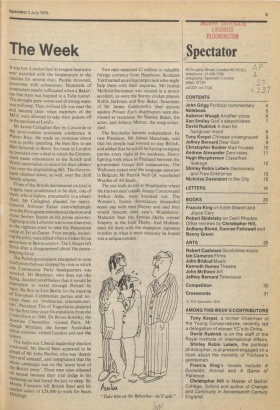The Week
It was hot. London had its longest heatwave ever recorded with the temperature in the nineties for several days. People drowned, Overcome with exhaustion. Hundreds of commuters nearly suffocated when a Bakerloo line train was trapped in a Tube tunnel. The drought grew worse and drinking water was polluted. That civilised life was near the end became clear when members of the MCC were allowed to take their jackets off in the pavilion at Lord's.
Mr James Callaghan flew by Concorde to the seven-nation economic conference in Puerto Rico. He made no promises about cuts in public spending. He then flew to see Herr Schmidt in Bonn. En route in London he presided over a deal in which the Government made concessions to the Scotch and Welsh nationalists in return for their abstention over the shipbuilding Bill. The Government climbed down, as well, over the child benefit scheme.
Three of the British mercenaries on trialin Angola were condemned to be shot, one of them, who is legless, presumably in a wheelchair. Mr Callaghan pleaded for mercy. General Antonio Eanes overwhelmingly won the Portuguese presidential election and Chose Senhor Soares as his prime minister. Fighting in the Lebanon was worse than ever as the rightists tried to take the Palestinian camp at Tel al-Zaatar. Four people, including the pilot, were killed when a rocket hit an aeroplane at Beirut airport. The Libyans left Syria after a disagreement about the peacekeeping force.
The Polish government attempted to raise food prices but was stopped by riots in which one Communist Party headquarters was wrecked. Mr Brezhnev, who does not like flYing, decided nevertheless that it would be imprudent to travel through Poland by train. He flew to East Berlin for the meeting of European Communist parties and lectured them on 'proletarian internationalism'. President Tito of Yugoslavia attended for the first time since his expulsion from the Cominform in 1948. Dr Bruno Kreisky, the Austrian Chancellor, visisted Paris. Mr Gough Whitlam, the former Australian Prime minister, visited London and saw the Queen. • . The ludicrous Liberal leadership election continued. Mr David Steel appeared to be ahead of Mr John Pardoe, who was 'deeply hurt and amazed', and complained that the Whole campaign was on the 'sewer level of the British press'. Three men were released
on appeal because their trial judge in his .sumrning-up had bored the jury to sleep. Sir Monty Finniston left British Steel and his
Modest salary of £28,000 to work for Sears Holdings. • Two men remqved E2 million in valuable foreign currency from Heathrow. Scotland Yard named an airline cargo clerk who might help them with their inquiries. Mrs Justice Melford-Stevenson was injured in a motor accident, as were the Surrey cricket players Robin Jackman and Ray Baker. Seventeen of Sir James Goldsmith's libel actions against Private Eye's distributors were dismissed as vexatious. Sir Stanley Baker, the actor, and Johnny Mercer, the song-writer, died.
The Seychelles became independent. Its new President, Mr James Mancham, said that his people had wanted to stay British, and added that he would be having swinging parties every night at his residence. Heavy fighting took place in Thailand between the government troops and communists. The Walloons rioted over the language question in Belgium. Mr Patrick Neill QC waselected Warden of All Souls.
The sun took its toll at Wimbledon where the top two men's seeds, Jimmy Connors and Arthur Ashe, were knocked out. The Women's Tennis Association demanded equal pay with men players and said they would boycott next year's Wimbledon. Malacate beat the Epsom Derby winner Empery in the Irish Derby. And Muhammad Ali drew with the champion Japanese wrestler in what it must sincerely be hoped was a unique contest.


































 Previous page
Previous page